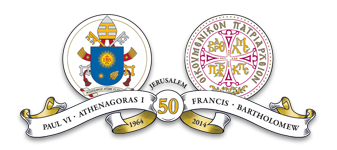 Pope Francis and Ecumenical Patriarch
Bartholomew: Pilgrims for Unity
Pope Francis and Ecumenical Patriarch
Bartholomew: Pilgrims for Unity
This pilgrimage commemorates the 50th
Anniversary of the meeting between Pope Paul VI
and Ecumenical Patriarch Athenagoras in 1964.
That blessed encounter captured the attention of
the Christian world. As the first meeting
between a Pope and an Ecumenical Patriarch since
1438, it marked a dramatic turn for the churches
from alienation to engagement.
Read More »
Read More »
 The Orthodox Church and the Catholic Church:
What Has Changed in Fifty Years
The Orthodox Church and the Catholic Church:
What Has Changed in Fifty Years
Within five decades, the Catholic Church and the
Orthodox Church formally have moved from
isolation to engagement, from monologue to
dialogue, and from misunderstanding to mutual
enrichment. These developments can only have
taken place with the inspiration of the Holy
Spirit, and with the commitment of devoted
clergy and laity to the process of
reconciliation. While the relationship between
the churches may differ from place to place,
this article outlines somme of the significant
developments in the past fifty years.
Read More »
Read More »
 The Purpose of the Meeting Between Pope
Francis and Ecumenical Patriarch Bartholomew in
Jerusalem
The Purpose of the Meeting Between Pope
Francis and Ecumenical Patriarch Bartholomew in
Jerusalem
On Sunday, May 25. 2014, Ecumenical Patriarch
Bartholomew and Pope Francis will meet at the
Church of the Holy Sepulcher to commemorate a
meeting in the Holy Land fifty years ago by
their revered predecessors, Ecumenical Patriarch
Athenagoras and Pope Paul VI.
Read More »
Read More »
 Visits of Ecumenical Patriarchs to Rome and
Popes to the Ecumenical Patriarchate
Visits of Ecumenical Patriarchs to Rome and
Popes to the Ecumenical Patriarchate
The official meetings of the Primates of the
Churches have always been ecclesiastical events
of great importance, for the reinforcement, and
hopefully, the restoration of the unity of faith
in the nexus of love. Such visits are in
accordance with the commandment of the Divine
Founder of the Church, our Lord Jesus Christ.
This article outlines meetings and visits
between Popes and Ecumenical Patriarchs from the
early centuries of Christianity through 2014.
Read More »
Read More »
 Patriarchate of Jerusalem
Patriarchate of Jerusalem
The Church of Jerusalem, which is biblically
speaking, the "Mother of all Christian
Churches," was elevated to the rank of
Patriarchate in the year 451 at the Fourth
Ecumenical Council held in Chalcedon.
Read More »
Read More »
 The Green Patriarch: Ecumenical Patriarch
Bartholomew and the Protection of the
Environment
The Green Patriarch: Ecumenical Patriarch
Bartholomew and the Protection of the
Environment
His All Holiness Ecumenical Patriarch
Bartholomew has persistently proclaimed the
primacy of spiritual values in determining
environmental ethics and action. His endeavors
have earned him the title “Green Patriarch”
– coined and publicized by the media in
1996, while being formalized in the White House
in 1997 by Al Gore, Vice President of the United
States. In 2008, Ecumenical Patriarch
Bartholomew was named one of Time Magazine’s 100
Most Influential People in the World for
“defining environmentalism as a spiritual
responsibility.”
Read More »
Read More »
 Quick Facts about the Ecumenical
Patriarchate
Quick Facts about the Ecumenical
Patriarchate
العربية
български
català
中文
English
suomi
français
Georgian
Deutsch
Ελληνικά
עברית
magyar
italiano
日本語
한국어
português
português
română
русский
Српски
español
svenska
Türkçe
українська
Information about the Ecumenical Patriarchate
and His All Holiness Ecumenical Patriarch
Bartholomew
Read More »
Read More »
 The Return of the Holy Relics of St. Gregory
the Theologian and St. John Chrysostom
The Return of the Holy Relics of St. Gregory
the Theologian and St. John Chrysostom
In 2004, responding to the request of His All
Holiness Ecumenical Patriarch Bartholomew, and
recognizing the importance of St. John
Chrysostom and St. Gregory the Theologian to
Orthodox Christians around the world, Pope John
Paul II agreed to return the relics of these two
great Fathers of the Church and Ecumenical
Teachers to their original resting place in the
Ecumenical Patriarchate.
Read More »
Read More »
 History of The Ecumenical Patriarchate
History of The Ecumenical Patriarchate
Following the establishment of Constantinople
(the ancient city of Byzantium) as the state
capital of the Roman Empire in the early part of
the fourth century, a series of significant
ecclesiastical events saw the status of the
Bishop of New Rome (as Constantinople was then
called) elevated to its current position and
privilege. The Church of Constantinople is
traditionally regarded as being founded by St.
Andrew, the “first-called” of the Apostles. The
3rd canon of the Second Ecumenical Council held
in Constantinople (381) conferred upon the
bishop of this city second rank after the Bishop
of Rome. Less than a century later, the 28th
canon of the Fourth Ecumenical Council held in
Chalcedon (451) offered Constantinople equal
ranking to Rome and special responsibilities
throughout the rest of the world and expanding
its jurisdiction to territories hitherto
unclaimed.
Read More »
Read More »
 The Ecumenical Patriarchate
The Ecumenical Patriarchate
The Ecumenical Patriarchate is the highest see
and holiest center of the Orthodox Christian
Church throughout the world. It is an
institution with a history spanning seventeen
centuries, during which it retained its see in
Constantinople (present-day Istanbul). It
constitutes the center of all the local Orthodox
Churches, heading these not by administration
but by virtue of its primacy in the ministry of
pan-Orthodox unity and the coordination of the
activity of the whole of Orthodoxy.
Read More »
Read More »
